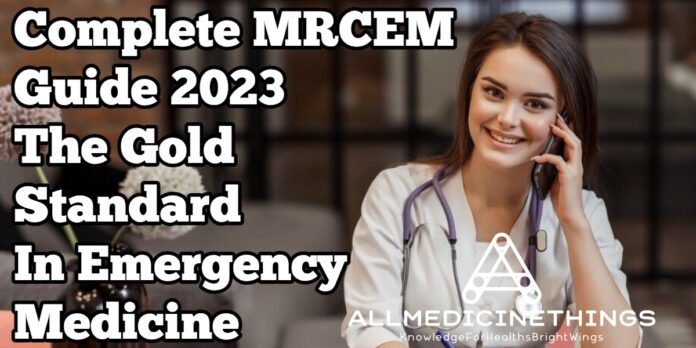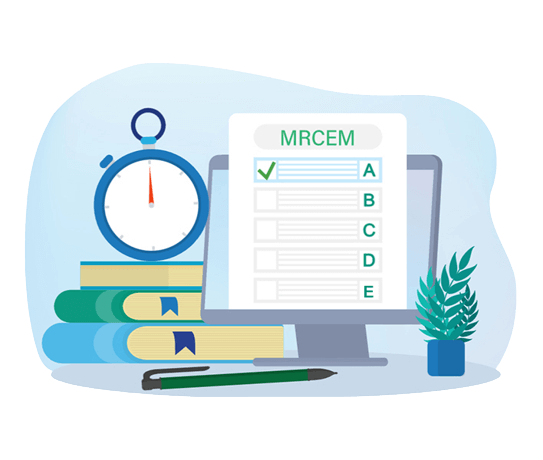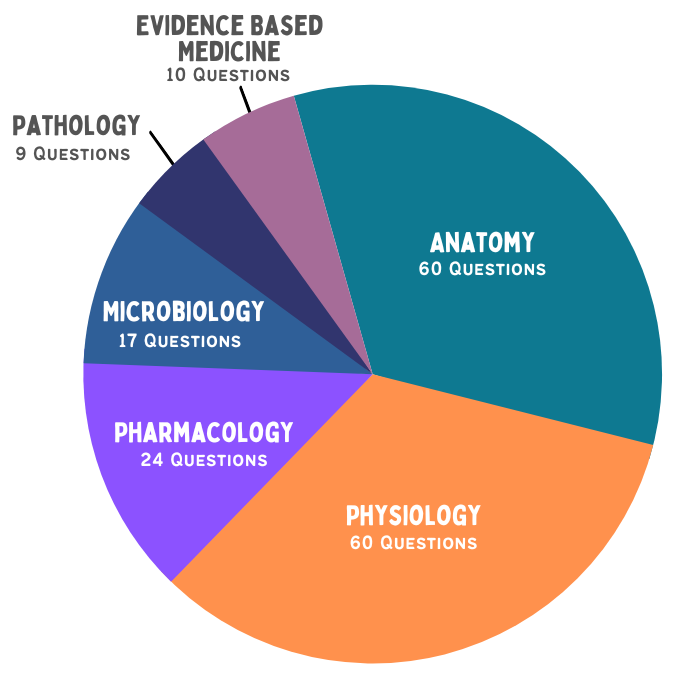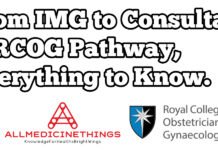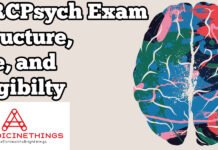Introduction
Hello, future heroes of the emergency room! 🚑💉 If you’re reading this, chances are you’ve either plunged headfirst into the exhilarating world of emergency medicine or you’re standing on the edge, wondering if you should dive in. Either way, you’ve probably heard whispers—or loud proclamations—about the MRCEM, otherwise known as the Membership of the Royal College of Emergency Medicine. Intrigued? You should be. This blog post should serve as your ultimate MRCEM guide for the coming years.
In the next few sections, we’ll embark on an extraordinary journey into the heart of this prestigious qualification. Think of this as your treasure map: laden with pearls of wisdom, hidden gems of advice, and even a few cautionary tales about sirens and pitfalls you might encounter. But fear not! For every treacherous reef, there’s a guiding lighthouse, and in the realm of emergency medicine, MRCEM is that lighthouse.
Designed to help you navigate complex medical emergencies, perfect that life-saving procedure, and master the art of patient care, MRCEM is not just an examination; it’s a rite of passage. From honing in on your practical skills to leveling up your theoretical knowledge, MRCEM serves as a comprehensive package for becoming the ultimate emergency medicine professional.
So grab your stethoscope, pull up a chair, and keep those eyes peeled. Whether you’re a seasoned veteran considering the next steps in your career or a medical student in awe of the A&E (Accident and Emergency), this guide is your one-stop-shop for all things MRCEM. Ready? Let’s dive in!
History: Unveiling the Saga of MRCEM
Ah, the MRCEM—a gem with a storied past that could rival any epic saga. From its humble origins to its star-studded milestones, this is a tale worth recounting. So, gather ’round, because we’re stepping into the time machine!
Origin of MRCEM
Let’s travel back in time to the United Kingdom, the birthplace of MRCEM. Imagine a group of emergency medicine practitioners huddled in a dimly lit room, poring over medical textbooks and scribbling on chalkboards—much like the wizards at Hogwarts. They recognized a gaping hole in the standardization of emergency medical training. And what do you do when there’s a hole? You fill it! And thus, MRCEM was born, as an initiative by the Royal College of Emergency Medicine, to create a unified and rigorous standard for those who dare to tread the adrenaline-fueled corridors of the emergency room.
Evolution Over the Years
But hey, Rome wasn’t built in a day, and neither was MRCEM. Over the years, it has transformed itself, undergoing various tweaks, overhauls, and face-lifts. Think of it like a software update for your smartphone but far, far more critical. The MRCEM curriculum has adapted to include advancements in technology, procedures, and medical ethics. Nowadays, it’s not just an exam but a multi-faceted assessment process involving written exams, practical skills, and even a hint of theatrical performance with OSCE (Objective Structured Clinical Examinations).
Remember when emergency rooms were a wild west of sorts, filled with dedicated, yet disparate practices? Those days are gone, thanks in large part to the continually evolving standards set by MRCEM.
Key Milestones
Ah, who doesn’t love a good milestone? In MRCEM’s journey, there have been several.
- Global Expansion: Originally a British phenomenon, MRCEM has expanded its wings across the globe. Whether you’re in Sydney or Singapore, you can take MRCEM exams. Talk about global recognition!
- Curriculum Overhaul: Around the early 2000s, MRCEM underwent a significant curriculum redesign, focusing more on real-world applicability rather than textbook regurgitation.
- Introduction of Part C/OSCE: The incorporation of the OSCE into the MRCEM process was a game-changer, folks. It’s where you go from theory-savvy to action-hero, proving you can walk the walk, not just talk the talk.
- Online Examinations: In response to the digital age and global pandemics, MRCEM adapted to offer parts of its exams online, showcasing its flexibility and commitment to staying current.
So, from its noble origins in the UK to its current status as an international gold standard in emergency medicine, MRCEM has had quite the odyssey. As it continues to evolve, so does the field it represents—making it an ever-relevant milestone for any doctor looking to specialize in emergency medicine.
Benefits of MRCEM: More Than Just a Shiny Badge
Ready to be convinced that MRCEM is the golden ticket you’ve been looking for? Well, hang onto your scrubs because the benefits of this qualification are practically bursting at the seams! From the ability to drop “MRCEM” behind your name (and watch as people’s eyebrows soar in admiration) to actually making you a wizard in the ER, here’s why MRCEM is a game-changer.
Professional Recognition
Picture this: You walk into a conference filled with emergency medicine experts. You introduce yourself and add, “I’ve completed my MRCEM.” Instantly, you see a gleam of respect in their eyes. That’s right, MRCEM is like the Ivy League of emergency medicine; it’s recognized worldwide and immediately sets you apart as someone who’s done more than just the basics. It’s the medical equivalent of having a black belt in karate—a badge of honor that says, “I know what I’m doing, and I have the credentials to prove it!”
Enhanced Skill Set
Remember how Neo suddenly knows Kung Fu in ‘The Matrix’? Okay, MRCEM isn’t that instant, but it’s pretty darn transformative. The exams cover everything from medical theory to clinical application, ensuring that you’re as well-rounded as a Swiss Army knife. You’ll learn how to decipher complex ECGs, manage traumatic injuries like a pro, and communicate bad news with empathy and tact. In essence, MRCEM doesn’t just prepare you for the test; it prepares you for real-life, high-stakes situations. And let’s face it, nothing’s more high-stakes than an emergency room on a busy night.
Job Opportunities
You know that dream job you’ve been eyeing? The one that demands a list of qualifications as long as a CVS receipt? Well, having MRCEM on your resume is like having a VIP pass at a concert. It opens doors to higher-level positions, academic appointments, and even international opportunities. In a world where everyone is clamoring to be noticed, MRCEM acts like a spotlight on your resume, drawing attention and signaling to employers that you are the real deal. Plus, it provides you the leverage to negotiate for better terms of employment—yes, think better salary, work conditions, and responsibilities.
Networking
Let’s not forget the power of schmoozing, shall we? Becoming an MRCEM member gives you exclusive access to a community of like-minded professionals. We’re talking about workshops, conferences, and seminars where you can rub elbows with the crème de la crème of emergency medicine. It’s like being part of an elite club—except instead of secret handshakes, you share clinical tips and career advice. Who knows, your next job opportunity might just come from a casual conversation at an MRCEM event.
MRCEM Exams Structure: The Roadmap to Glory
Alright, buckle up, because this is where the rubber meets the road. If MRCEM is a mountain, consider this section your trusty Sherpa guiding you through the trek. First on the itinerary is MRCEM Part A, the gateway to the emergency medicine wonderland. Let’s break it down.
MRCEM Part A: The Brain Gymnastics
Objective of the Exam
If you’re picturing an exam room filled with robots and holograms, reel it in. MRCEM Part A might not be futuristic, but it’s the cornerstone for what’s to come. Its objective is simple yet profound: to ensure you have the medical knowledge of a guru and the foundational understanding of a Yoda. Yes, the exam tests your theory but think of it as a safety net, ensuring you have what it takes to excel in the practical, life-or-death situations that will come later.
Syllabus: A Smorgasbord of Medicine
Anatomy
We’re talking bones, muscles, organs—the whole nine yards. Imagine yourself as a sculptor, understanding every curve and nuance of the human body. You’ll delve deep into topics like neuroanatomy, musculoskeletal structures, and the circulatory system. The goal is not just to recognize body parts but to understand how they function in perfect (and sometimes imperfect) harmony.
Physiology
It’s time to unlock the secrets of the human body—how everything works, from the beating of a heart to the synapses firing away in the brain. Get ready to learn about homeostasis, cellular functions, and more, all geared towards making you a physiological Sherlock Holmes.
Pharmacology
This isn’t your grandma’s medicine cabinet. Pharmacology in MRCEM Part A will have you studying drug interactions, adverse effects, and even the pharmacokinetics and pharmacodynamics behind common drugs you’ll use in emergency scenarios.
Microbiology
From the bacteria that wreak havoc to the viruses that go viral (literally), the microbiology portion will sharpen your knowledge on how microscopic organisms can cause macro-problems in emergency medicine.
Pathology
This is where you don your detective cap. You’ll investigate how diseases manifest, spread, and can ultimately be contained. It’s like being a gumshoe, but for diseases.
Evidence-based Medicine
Evidence-based medicine isn’t just a buzzword; it’s the North Star guiding your clinical decisions. In Part A, you’ll get the rundown on how to critically appraise medical literature and apply it to real-world scenarios.
Question Format
The MRCEM Part A is typically a multiple-choice exam, sprinkled with some single best answer questions, and maybe even some multiple true-false items. It’s not a walk in the park, but it’s not an episode of “Survivor” either.
Recommended Study Materials
While there’s no magic potion to make you pass, a variety of study materials can be your lifeline. Textbooks like “Emergency Medicine MCQs” and “MRCEM Part A: 125 SBAs” are great for foundational knowledge, and online platforms like EM Revision offer interactive learning.
Tips and Tricks for Success
- Time Management: Start early and set up a dedicated study schedule. MRCEM Part A is not something you can cram.
- Practice Questions: The more you practice, the less the actual exam will surprise you.
- Understand, Don’t Memorize: This isn’t a rote learning test. Comprehension trumps memorization every single time.
- Take Breaks: Your brain also needs rest. Schedule short breaks during study sessions for optimal learning.
- Join Study Groups: Sometimes, two (or more) heads are better than one.
So there you have it—the ins and outs of MRCEM Part A. Remember, this is just the first leg of your MRCEM journey. Ahead lies a path filled with challenges and triumphs, and Part A is your starting block. Next up, we’re diving into MRCEM Part B. Prepare for liftoff!
MRCEM Part B: The Clinical Crusade
Done patting yourself on the back for conquering Part A? Good, because now it’s time for Round 2! If MRCEM Part A was the dress rehearsal, consider Part B the opening night. This is where you’ll apply all that theoretical knowledge and show that you’re more than just book-smart—you’re ready for the front lines!
Objective of the Exam
MRCEM Part B is the ‘Mission: Impossible’ of medical tests, minus Tom Cruise and the dramatic stunts (although you may feel like performing a few). The objective? To assess your ability to apply clinical knowledge in practical, real-world emergency scenarios. Think of it as the Kobayashi Maru for aspiring emergency medicine doctors, testing your decision-making skills, clinical acumen, and of course, your ability to keep cool under pressure.
Syllabus: The Nitty-Gritty of Emergency Medicine
Data Interpretation
No, you won’t be crunching numbers for a Wall Street firm, but you will need to master the art of interpreting X-rays, CT scans, ECGs, and blood test results. Imagine being a medical Sherlock Holmes, deciphering clues to make life-altering decisions.
Clinical Procedures
Here, you’ll switch from thinking cap to action mode. You’ll get into the nitty-gritty of procedures like intubation, suturing, and lumbar puncture. Basically, it’s Grey’s Anatomy without the drama, but all the adrenaline.
Resuscitation Protocols
Remember those CPR dolls from your basic life support course? Well, the stakes are higher now. Part B ensures you know your ABCs of resuscitation, from infants to adults, because in an emergency, every second counts.
Question Format
Part B switches things up with OSCEs (Objective Structured Clinical Examinations). You’ll rotate through different stations, each presenting a unique clinical challenge. Picture it as a medical escape room where the objective is to showcase your diagnostic and procedural skills.
Recommended Study Materials
- OSCE books: ‘Best of Five MCQs for the MRCEM’ and ‘Get Through MRCEM Part B: OSCEs’ are strong contenders.
- Practice Scenarios: Mock OSCEs are a fantastic way to simulate the actual exam conditions.
- Video Tutorials: Platforms like YouTube offer a plethora of procedural tutorials, often demonstrated by experts.
Tips and Tricks for Success
- Simulate to Stimulate: Use mock OSCEs to recreate exam conditions. The more you simulate, the less you’ll sweat on exam day.
- Feedback is Gold: After each mock session, get feedback. Knowing your weaknesses is the first step in transforming them into strengths.
- Say it Aloud: During practice and the actual exam, verbalize your thought process. It shows the examiner that you’re thorough and systematic.
- Time is Money: Each OSCE station has a time limit. Practice being both quick and accurate, because in the ER, time waits for no one.
- Mental Prep: Don’t underestimate the power of a clear mind. Pre-exam jitters can be tamed with simple breathing exercises or mindfulness techniques.
So, sharpen your stethoscopes and polish your reflex hammers! MRCEM Part B is where you prove you’ve got the clinical chops to match your theoretical prowess. It’s the ultimate fusion of book smarts and street smarts in the realm of emergency medicine.
Strap in for the next chapter, where we’ll demystify MRCEM Part C, the grand finale of this medical trilogy.
MRCEM Part C (OSCE): The Grand Finale of Emergency Medicine Awesomeness
Roll out the red carpet and cue the dramatic music because it’s time for the grand finale: MRCEM Part C, also known as the OSCE (Objective Structured Clinical Examination). If Part B was your “Empire Strikes Back,” consider Part C your “Return of the Jedi.” But instead of fighting Sith Lords, you’re taking on the ultimate challenges of emergency medicine.
Objective of the Exam
Welcome to the Super Bowl of emergency medicine! The aim of MRCEM Part C is to catapult you from the realm of theory into the chaotic, unpredictable, and oh-so-rewarding world of actual clinical practice. It evaluates not just what you know, but how elegantly and effectively you can apply it. Can you talk to patients clearly? Can you handle a trauma scene with aplomb? Can you stitch like you’re sewing a quilt? Let’s find out!
Syllabus: The Triple Threat of Emergency Medicine
Communication Skills
If medicine is an art, then communication is your palette. You’ll need to demonstrate that you can deliver bad news sensitively, obtain a patient history like a pro, and explain complex treatments in terms a five-year-old could understand. You’re not just a doctor; you’re a mediator, counselor, and translator all rolled into one.
Practical Skills
Grab your medical toolkit because it’s time to play! You’ll be examined on procedures you’ll be performing daily in the ER, like inserting IV lines, performing CPR, and even running a trauma bay. It’s the medical equivalent of an ‘Iron Chef’ episode, but with scalpels and stethoscopes instead of knives and spatulas.
Clinical Scenarios
Picture this: a patient rushes into the ER with chest pain. What do you do? How do you react? These scenarios will test your ability to think on your feet, synthesize information, and make decisions that could literally be life-changing.
Question Format
The format? A series of OSCE stations where you’ll have to perform tasks, answer questions, and generally prove that you’ve got the right stuff. Imagine a mix between a high-stakes board game and a medical drama, only you can’t ask for a lifeline or script rewrite.
Recommended Study Materials
- OSCE Guidebooks: ‘Clinical Cases for MRCEM OSCEs’ and ‘Mastering Emergency Medicine: A Practical Guide’ are excellent resources.
- Simulations: Use realistic scenarios to prep for the clinical challenges you’ll face. Some ER departments even offer OSCE prep days.
- Video Reviews: Online platforms have video content that can help you brush up on both practical and communication skills.
Tips and Tricks for Success
- Know Your Marking Scheme: Different stations have different evaluation criteria. Know what’s expected to maximize your scores.
- Reflect and Iterate: Use your experiences in each station to improve your performance in the next. Each station is a new beginning.
- Active Listening: During patient interviews, listen actively and empathize. It can make a huge difference in your performance.
- Practice Under Pressure: Real emergencies won’t wait for you to be ready. Practice with a timer to get used to the pressure.
- Team Up: Partner with friends or colleagues for mock OSCEs. You’ll learn new approaches and get immediate feedback.
So there you have it, aspiring emergency medicine Jedi! MRCEM Part C is your final rite of passage, the ultimate test of your skills, knowledge, and flair in the ER. Once you conquer this, you’re not just another doctor; you’re a certified maestro in the high-stakes, pulse-pounding symphony that is emergency medicine.
Preparing for MRCEM Exams: Your Master Key to Success
The MRCEM exams are your passport to a rewarding career in emergency medicine. But preparing for them can feel like climbing Mount Everest in flip-flops. Fear not! With the right resources and strategy, you can conquer this mountain with the grace of a mountain goat. Let’s dive in!
Recommended Books: The Pillars of Wisdom
Books are your best friends in this journey. They provide a strong foundation of knowledge that will help you tackle the exams with confidence. Here are some must-haves:
- MRCEM Part A: 125 SBAs: This book is packed with Single Best Answer questions that mirror the format of the Part A exam. It’s a great way to test your knowledge and identify any weak areas.
- Best of Five MCQs for the MRCEM: This gem covers both Parts A and B and includes detailed explanations for each answer, helping you understand the ‘why’ behind each question.
- Clinical Cases for MRCEM OSCEs: This invaluable resource for Part C includes real-life scenarios and practical advice on how to approach them.
- Mastering Emergency Medicine: A Practical Guide: A comprehensive guide that covers all aspects of emergency medicine and is useful for all parts of the MRCEM.
Study Plans: Your Roadmap to Victory
A well-structured study plan is crucial for success. It helps you manage your time effectively, cover all the necessary topics, and avoid last-minute panic. Here are some tips for creating a killer study plan:
- Be Realistic: Don’t plan to study for 12 hours a day if you know you can only manage 6. Be honest about your capabilities and limitations.
- Be Flexible: Life is unpredictable. Build some flexibility into your plan to accommodate unexpected events.
- Review Regularly: Schedule regular review sessions to reinforce your knowledge and identify any areas that need further study.
Study Groups: Teamwork Makes the Dream Work
Joining a study group can be incredibly beneficial. It provides a support system, helps you stay motivated, and allows you to learn from others. Here are some tips for making the most of your study group:
- Choose Wisely: Select group members who are as dedicated and motivated as you are.
- Diversify: A group with diverse strengths and weaknesses can help cover all bases and ensure that everyone benefits.
- Practice Together: Use your group meetings to practice OSCE scenarios, quiz each other, and discuss difficult concepts.
Online Courses: Harnessing the Power of the Internet
The internet is a treasure trove of resources that can help you prepare for the MRCEM exams. Here are some recommended online platforms:
- EM Revision: This online platform offers a comprehensive collection of revision resources for all parts of the MRCEM.
- YouTube: There are several channels dedicated to emergency medicine that offer tutorials, case studies, and practice questions.
Mock Exams: The Final Frontier
Mock exams are the ultimate test of your preparation. They help you identify any remaining weak areas, practice managing your time, and build confidence. Here are some tips for making the most of your mock exams:
- Simulate Exam Conditions: Try to replicate the conditions of the actual exam as closely as possible. This means timing yourself, taking breaks at the same intervals, and answering questions in the same format.
- Analyze Your Performance: After each mock exam, take the time to analyze your performance. Identify any areas that need further study and adjust your study plan accordingly.
Stay Positive: Don’t be too hard on yourself if you don’t perform as well as you’d hoped. Use it as a learning opportunity and stay positive.
The Registration Saga: Navigating the Labyrinth of MRCEM
Ah, the dreaded administrative maze—filled with forms, deadlines, and eligibility criteria. It’s like a level from a video game that you have to pass to get to the really cool stuff. But don’t worry! Here’s your guide to crack this level and level up to the MRCEM challenge.
Eligibility Criteria: Are You The Chosen One?
Before you even think about applying, make sure you fit the bill. Eligibility criteria can vary based on your medical training, work experience, and prior qualifications. Here’s the usual rundown:
- Medical Degree: Obviously, you need one of these. It should be recognized by the Medical Council in the country where you completed your training.
- Work Experience: Have you put in some time in the emergency room or a related specialty? You’ll need some hands-on experience to qualify for the exam, usually at least a few months.
- Prior Exams: Some countries require you to pass preliminary exams, like PLAB in the UK, before you’re eligible for the MRCEM.
Application Procedure: Your Quest Begins
- Visit the Official Website: It’s where the magic begins! You’ll find a treasure trove of information, including dates, venues, and application forms.
- Online Account: Create an online account on the application portal, which will become your mission control for the MRCEM journey.
- Fill Out the Application Form: It’s not just ticking boxes; it’s like crafting your medical autobiography. Make sure all the information is accurate and up-to-date.
- Choice of Venue: Yes, you get to pick where you’ll face your destiny—choose wisely based on location, dates, and availability.
Fees: The Golden Ticket
Ah, the part where you part with your hard-earned money. Fees for the MRCEM exams can vary based on the exam center and currency fluctuations. Generally, you can expect:
- Part A: $300 – $400
- Part B: $400 – $500
- Part C: $600 – $800
Note: Always check the official website for the most current fee structure.
Required Documentation: The Paper Trail
The MRCEM application process requires you to prove you’re not just some random person who’s really good at “Operation”. Here are some documents you’ll generally need:
-
- Proof of Medical Degree: A copy of your medical diploma, usually notarized or attested.
- Proof of Work Experience: Letters of recommendation, pay stubs, or other forms of verification from your place of employment.
- Identification: A government-issued ID, usually a passport, to prove you’re you.
- Prior Exam Certifications: If applicable, you’ll need to provide proof of passing exams like PLAB.
- Photograph: A recent passport-sized photograph that shows you in all your professional glory.
Examination Centers: The Battle Arenas of MRCEM
Choosing the right examination center is like picking your home turf for the ultimate showdown. It’s not just about the location but also about what you can expect when D-Day arrives. Buckle up, future emergency medicine rockstar; let’s talk about where you’ll earn your stripes!
Locations: Choose Your Arena
MRCEM exams are hosted at various locations around the globe, from bustling metropolises like London to quieter locales. Here are some points to consider:
- Proximity: The closest center might be the most convenient, but don’t forget to weigh other factors like venue reputation and facilities.
- Availability: Popular centers get booked fast! It’s like trying to grab the last piece of pizza at a party—you’ve got to be quick!
- Country-Specific Rules: Some countries may have specific requirements for hosting MRCEM exams, so check those out when selecting a location.
Scheduling: Picking Your Battle Date
When you register for MRCEM, you’ll have the option to choose your exam date within a given window. Here’s how to play this:
- Peak Seasons: Avoid scheduling your exam too close to popular holidays or major events when centers are more likely to be filled.
- Personal Schedule: Consider your own schedule, including work commitments, family events, and even your study pace.
- Flexibility: Keep some buffer time before and after your exam. You never know when you might need a last-minute revision sprint or post-exam downtime.
What to Expect on Exam Day: The Countdown Begins!
Alright, the big day is here. You’ve been training for this, and now it’s time to show what you’ve got. Here’s a sneak peek of what the exam day usually entails:
- Arrival: Aim to arrive at least an hour early. This is not the time for a dramatic, last-minute entry.
- ID and Documentation: Keep your identification and any required documentation handy. You’re not getting in without these golden tickets.
- Personal Items: Most centers have lockers where you can stash your belongings, but it’s best to bring only what you need.
- The Exam Room: Ah, the battlefield. You’ll be assigned a seat, and instructions will be given. Listen carefully; this is not the time to daydream about your post-exam vacation.
- During the Exam: Time management is key. Keep an eye on the clock but don’t rush. Remember, it’s a marathon, not a sprint.
- After the Exam: Breathe. Whether you think you nailed it or not, it’s over, and you did your best. Post-exam rituals vary: some people like to review what they could’ve done better, others prefer to celebrate. Choose what suits you!
Selecting the right examination center, scheduling it according to your needs, and knowing what to expect on exam day are crucial steps in your MRCEM journey. Think of them as mini-levels you need to clear on your way to the ultimate prize: becoming a certified emergency medicine professional. Let the games begin!
Scoring and Results: The Moment of Truth in the MRCEM Odyssey
After months of grueling preparation and nerve-wracking exams, it’s finally time to find out if you’ve earned your medical wizardry badge. Ah, the suspense—it’s like waiting for the season finale of your favorite TV show, but with way more at stake! So let’s unravel the mystery of MRCEM scoring and results.
Scoring System: How Your Fate is Sealed
Understanding the scoring system is like deciphering the code to the safe containing your dreams. Here’s the rundown:
- Scale: MRCEM scores are usually scaled, meaning they reflect not just the number of questions you got right, but also the difficulty level of the questions.
- Negative Marking: Thankfully, MRCEM usually doesn’t have negative marking, so your ‘educated guesses’ won’t cost you.
- Sectional Scoring: For some parts of the MRCEM, you may receive sectional scores. You need to ace each section, not just get a cumulative passing score.
- Minimum Pass Marks: These are the magical numbers you’re aiming for. They’re set by the examination board and may vary from year to year.
Pass Rates: The Odds You’re Up Against
Wouldn’t it be nice to know what you’re up against? Knowing the pass rates can either be a morale booster or a reality check. Either way, it’s better to know!
- General Trends: Pass rates can fluctuate but usually hover around a certain percentage. For example, the MRCEM Part A might have a pass rate of around 65-70%.
- Subject-Specific Rates: Some sections might have higher or lower pass rates. Knowing this can help you focus your preparation on weaker areas.
Result Notification: The Drumroll Moment
The way you receive your results can be as dramatic or as nonchalant as you make it. Either way, here’s how it goes down:
- Online Portal: Results are usually first posted on the online portal you used for registration. Remember your login details; you don’t want to be locked out at this crucial moment!
- Email Notification: Some exam centers also send out email notifications. If you see an email with the subject “MRCEM Results,” take a deep breath before you click!
- Certificate: Upon passing, you’ll receive an official certificate, your physical proof of being an emergency medicine demigod. Frame it, flaunt it, but most importantly, use it to better healthcare!
- Resits: If the results aren’t in your favor, don’t lose heart. Many great doctors didn’t pass on the first go. Find out the process for retaking the exam and hit the books again—you’ve got this!
Whether you’re refreshing your browser every three seconds to see your results or calmly awaiting the email notification, remember that your score is just one step in your long, fulfilling career as an emergency medicine professional. So, are you ready for the big reveal? Drumroll, please…
Life After MRCEM: Welcome to the Next Level of Your Medical Odyssey!
Congratulations, you’ve slain the dragon, conquered the fortress, and emerged victorious in your MRCEM quest. But as every hero knows, the adventure doesn’t end when you retrieve the treasure; it’s just the beginning of a new chapter! Let’s explore what the world has in store for you, O Knight of Emergency Medicine!
Fellowship Opportunities: The Elite Guilds Awaiting You
In RPG terms, a Fellowship is like joining an elite guild where you can level up your skills, gain rare items (like specialized knowledge), and team up with other legendary heroes (esteemed professionals).
- Academic Fellowships: Are you the Hermione Granger of medicine? Continue your research while working in an academic environment.
- Clinical Fellowships: Perfect for those who want to dive deeper into specific areas like Pediatric Emergency Medicine, Trauma, or Critical Care.
- International Fellowships: Ever dreamt of being a medical Indiana Jones? Participate in fellowships abroad to gain a global perspective.
Job Prospects: Where Your Journey Continues
MRCEM is your golden ticket to a whole Willy Wonka factory of job opportunities. But instead of chocolate rivers, you’ll find a flowing stream of chances to save lives and make a real impact.
- Emergency Departments: The frontline of healthcare; it’s where you always wanted to be, right?
- Urgent Care Centers: Less hectic than an ER, but no less important.
- Teaching Hospitals: Shape the next generation of emergency medicine physicians while honing your own skills.
- Private Practice: For those who dream of being their own boss, setting up a private emergency medicine practice is an option.
- Global Opportunities: MRCEM is recognized in various countries. Want to work in Australia next year? How about Dubai? The world is your oyster!
Further Specializations: Become a Master of Your Craft
You’ve got the basics down; now it’s time to specialize! Just like choosing a subclass in a role-playing game, further specialization allows you to focus on specific skills and roles.
- Toxicology: For those who want to be the Sherlock Holmes of poisoning cases.
- Sports Medicine: If you can’t be in the Olympics, you can at least treat those who are!
- Medical Education: Merge your love for medicine and teaching, and become the Dumbledore of emergency medicine.
- Disaster Medicine: Be the hero the world needs in times of natural disasters or other large-scale emergencies.
- Administrative Roles: If you’ve got a knack for leadership, consider roles like Emergency Department Director or Chief Medical Officer.
Life after MRCEM is not a quiet walk into the sunset; it’s a joyful sprint into a world bursting with opportunities. Whether you choose the path of a clinician, an academic, or a globe-trotting medical adventurer, your MRCEM qualification is the trusty sword by your side. Onward, to greater quests and grander victories!
Common Pitfalls and How to Avoid Them: Dodging Quicksand on Your MRCEM Quest
Picture this: you’re on a mythical quest to retrieve the golden chalice of MRCEM success, but just before you reach it, you fall into a pitfall! Don’t worry, you’re not alone, and unlike in the movies, you get to try again. But why not learn to sidestep these traps in the first place? Buckle up, it’s time for some sage advice.
Time Management: Beating the Clock, Not Beaten by It
Time management is like the invisibility cloak that lets you bypass guards (read: distractions) and reach your goal more efficiently.
- Prioritize Topics: Not all topics are created equal. Know which ones deserve your undivided attention and which can be skimmed.
- Set a Schedule and Stick to It: Create a study schedule with milestones. Treat it like a gym routine—no excuses!
- Time Your Practice Tests: It’s one thing to answer questions correctly; it’s another to do so quickly. So set that timer!
- Avoid Procrastination: Remember, your MRCEM exam won’t wait, even if you binge-watch an entire season of “Grey’s Anatomy” for “study inspiration.”
Neglecting Certain Topics: Don’t Ignore the Side Quests
We get it; some topics are as exciting as watching paint dry, but they might just contain the info you need to pass the exam.
- Identify Weak Areas Early: Acknowledging that you’re not fond of, say, microbiology, is the first step towards tackling it head-on.
- Integrate Them Into Your Routine: Mix boring topics with ones you enjoy to create a balanced study diet.
- Seek Help: If a topic feels like deciphering ancient runes, maybe it’s time to consult a tutor or use interactive learning tools.
Underestimating the Exam: This Isn’t a Pop Quiz!
Some adventurers underestimate the dragon before facing it—don’t be that person.
- Know the Format: Think of it as recon before a big battle. Understand the type and format of questions that will be asked.
- Don’t Skimp on Mock Exams: Taking mock exams helps gauge the level of difficulty and the breadth of topics covered.
- Listen to the Veterans: Those who’ve walked the path before you have valuable insights. Read forums, attend webinars, and take notes.
Stress Management: Keep Your Cool, Champion
Even heroes need to chill! Stress can be your kryptonite if not managed well.
- Take Breaks: Your brain needs to breathe! Short breaks during study hours can increase productivity.
- Physical Exercise: A bit of cardio can release endorphins and reduce stress. Consider it your in-quest potion for instant rejuvenation.
- Mindfulness and Relaxation Techniques: Simple breathing exercises or mindfulness can refocus your mind, making it your sharpest weapon.
- Talk About It: Sometimes, sharing your concerns with a friend or family member can provide a fresh perspective and emotional relief.
Being aware of these common pitfalls is like having a map that marks where all the hidden traps are. Now that you know what to look out for, you’re more equipped to navigate through the treacherous but exciting journey that is the MRCEM exam. Go forth, brave adventurer, and may the odds be ever in your favor!
Encouragement for Aspiring Emergency Medicine Physicians: The Final Pep Talk
Alright, young squire, gather ’round. Hear this: the path to MRCEM may be strewn with challenges, but that’s what makes the journey worthwhile. For every long night of studying, envision a future where you’re the knight in shining armor in an Emergency Room, saving lives. For every difficult topic or practice test, see it as a training duel to prepare you for the real battles ahead.
You are the protagonist of your own epic. The MRCEM is but a trial, a proving ground, for you to show the world—and yourself—just what you’re made of. And trust me, what you’re made of is the stuff of legends.
So, don your armor, unsheathe your sword, and open that study book. Your MRCEM quest awaits, and I, for one, can’t wait to hear your success story.
In the words of a famous wizard, “You’re braver than you believe, and stronger than you seem, and smarter than you think.”
Comment your questions down below and we also have a few useful links incase you want to consider those pathways.
Onward to glory, future emergency medicine virtuoso!
Thinking to Consider USMLE in 2023? Look at this first
MRCP: A 2023 Comprehensive Guide for IMGs
The Aspiring Surgeon’s Blueprint: The Complete MRCS Guide 2023

